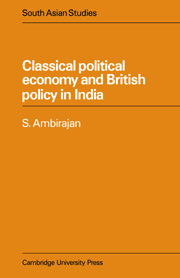Book contents
- Frontmatter
- Contents
- Dedication
- Acknowledgments
- 1 Introduction
- 2 Economic ideas and British policy towards India
- 3 Economic ideas and famine policy
- 4 Economic ideas and economic relations
- 5 Economic ideas and land taxation
- 6 Economic ideas and taxation policies
- 7 Political economy and a policy of economic development
- 8 The state and the policy for economic development
- 9 Conclusion
- Select bibliography
- Index
4 - Economic ideas and economic relations
Published online by Cambridge University Press: 31 March 2010
- Frontmatter
- Contents
- Dedication
- Acknowledgments
- 1 Introduction
- 2 Economic ideas and British policy towards India
- 3 Economic ideas and famine policy
- 4 Economic ideas and economic relations
- 5 Economic ideas and land taxation
- 6 Economic ideas and taxation policies
- 7 Political economy and a policy of economic development
- 8 The state and the policy for economic development
- 9 Conclusion
- Select bibliography
- Index
Summary
It appears to me that if the people of the Punjab do not understand that when they borrow money they must repay it, and that the whole of their property is liable for its repayment, they cannot be taught that lesson too soon or too emphatically. It appears to me to be one of the chief lessons which we are here to teach.
Sir James Fitzjames StephenYou find your doctrinaire philosophers in London ride a hobby to death. But in London they are kept in order by checks and opposition in a thousand forms. Imagine how the same men would ride their hobbies, when invested with despotic power, over a million or two Indian peasants. It is such men who upset native tenures, turn society topsy-turvey, and with the best intentions drive a whole people in mad revolt.
Sir Henry Bartle-FrereTHE END OF USURY REGULATION
Distress caused by famine was due to man's uncertain relationship with Nature. There were other areas, however, where distress was the result of man's relationship with other men. As seen in the previous chapter, the policy of the government towards famine started as interventionist, then became inspired by free trade, and finally guardedly interventionist. British policy in the nineteenth century towards a number of economic relationships also underwent similar changes. We mean by economic relations the voluntary (or seemingly voluntary) arrangements that two parties come to in connection with either the allocation or production of resources.
- Type
- Chapter
- Information
- Classical Political Economy and British Policy in India , pp. 101 - 143Publisher: Cambridge University PressPrint publication year: 1978



